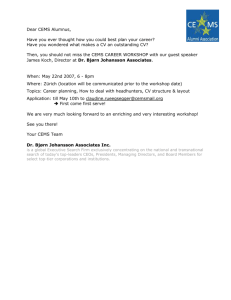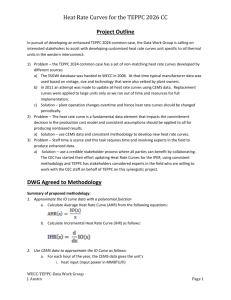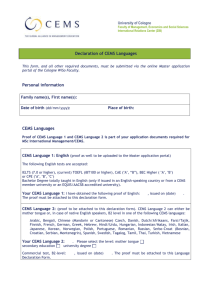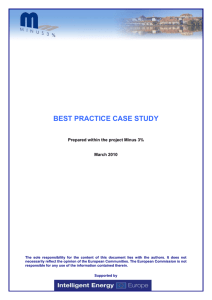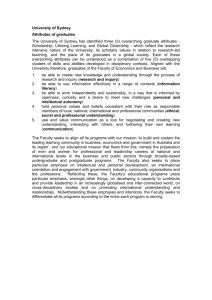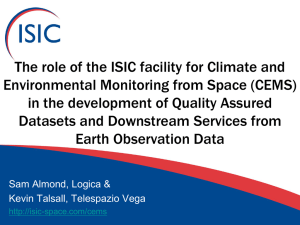Master of Science (MSc) International Management/CEMS
advertisement
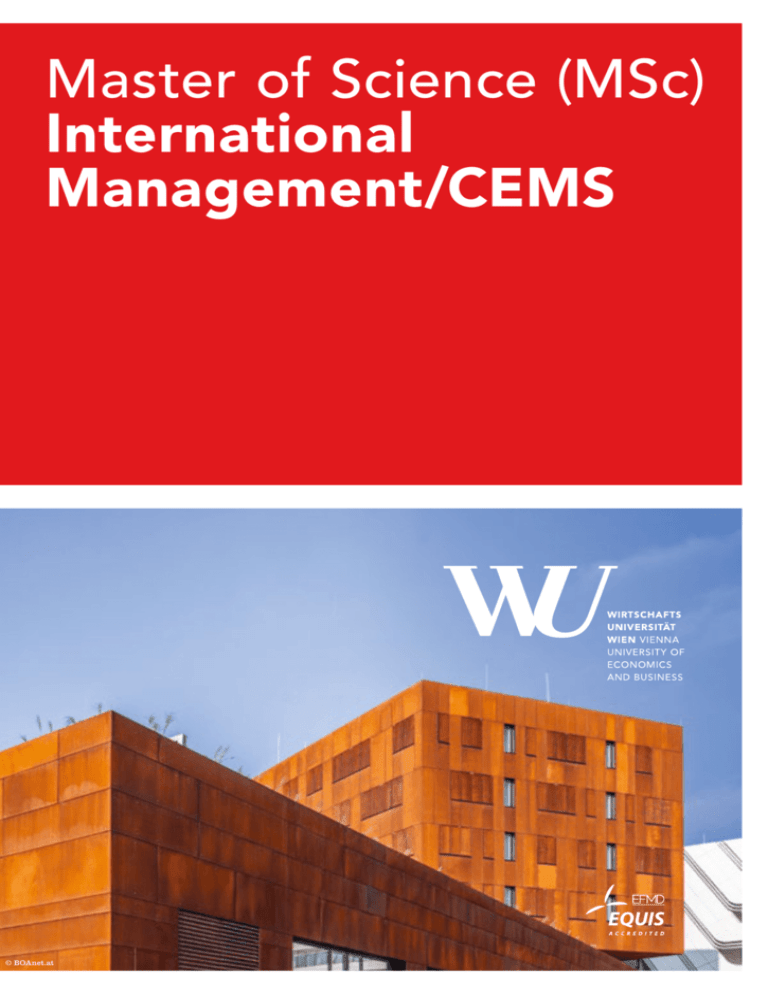
Master of Science (MSc) International Management/CEMS © BOAnet.at “A.T. Kearney is a global team of innovative, insightful and collaborative management consultants, dedicated to delivering creative, meaningful and above all sustainable results. Our consultants have to be personalities who combine expertise and analytical skills with innovative and creative thinking. Often we find these personalities among CEMS graduates, which is one of the reasons why we gladly collaborate with CEMS and WU (Vienna University of Economics and Business).” (ROBERT KREMLICKA, Partner & Managing Director A.T. Kearney Ges.m.b.H. Austria) © BOAnet.at 3 MSc International Management/CEMS “CEMS is characterised by a striving for ethics and excellence that unites colleagues, students, and partners involved in this unique community.” (Professor Rebecca Riekkari, Vice Dean Aalto University School of Business) DEAR PROSPECTIVE STUDENTS, Participation in the Master in International Management/ CEMS program is all about opportunities: the opportunity to benefit from an international education and to experience cultural diversity in Vienna and worldwide, the opportunity to be in contact with companies involved in the development of management education, to have privileged access to the recruitment pool of highly renowned CEMS Corporate Partners, and the opportunity to contribute to and benefit from the CEMS network. We are proud that since 2005, the Master in International Management/CEMS – available in Austria exclusively at WU – has placed consistently among the top three programs by the renowned international Financial Times Masters in Management ranking. Open to a select group of students from all over the world, this program combines two degrees into one program – WU’s MSc and the CEMS MIM (Master in International Management offered by CEMS). The program is specially designed to meet the needs of the global marketplace in an international and multicultural setting, and offers a stimulating learning environment through the wide variety of professional, academic, and research experience brought to the classroom. It gives you the academic and practical knowledge you need for a successful international career. Students are expected to have excellent academic records and show a strong interest in working in a culturally diverse global environment. Prospective students are expected to show an active interest in international business and other cultures, have an aptitude for foreign languages, and be willing to spend part of their studies abroad. We are looking forward to welcoming you to our program! Jan Hendrik Fisch Program Director International Management/CEMS MSc International Management/CEMS AT A GLANCE Duration 4 semesters, full-time degree program Credits 120 ECTS credits (incl. 20 ECTS credits for the master thesis) Language of instruction English Degree awarded to graduates Master of Science (WU) and the CEMS MIM degree Start Every winter semester Capacity Up to 80 students per academic year Application Rolling admissions start in September 2015 (more information on page 10) Contact cems@wu.ac.at 5 Content and Structure Students can expect to find various core components like an excellent management education, a term abroad at an elite partner school, hands-on business experience during an international internship, and a capstone business project. FIRST YEAR SECOND YEAR For half of the class, the Master in International Management/CEMS starts with an intensive one-week block seminar. During the first semester, a number of foundation courses (compulsory core courses) will provide all students with basic skills in international management. In addition to these courses, students can choose from a wide range of electives. In the third semester, the other half of the students will spend a semester abroad and start the year with a block seminar. The development of specialist knowledge is the main target in this part of the program. Students will deepen their fundamental understanding of the material by choosing electives at WU or at one of the CEMS partner universities. In the second semester, the focus lies on strengthening students’ theoretical knowledge and on gaining international experience. Half of the students will spend this semester at one of the CEMS partner universities abroad. A business project for an internationally-operating company is conducted, and students gain working experience abroad in an internship during the summer break. “CEMS taught me to be more flexible (respectful with of opinions), open-minded about accepting new challenges, and self-confident without being arrogant.” (Igor Takeshi Nishimura – CEMS Alumnus 2006) In the fourth semester, students can concentrate on and complete their master thesis, focusing on international management. Further electives can also be chosen. GENER AL PROGR AM STRUCTURE Core courses, required for all students Managing Globalization, Global Strategic Management, Global Marketing Management, Global Financial Management, Global Management Practice Management Practice International Business Project, Block Seminar, Responsible Global Leadership Seminar providing students with unique insights into corporate practice. Electives Large variety of Functional Courses with International Perspective, International Industries, International Markets, International Environments. Regional Focus WU offers a variety of region-specific classes taught by experts from all over the world. The main focus lies on Asia and CEE countries. Students are required to take at least one of these courses. Further elements Business Communication Skill Seminar, Skill Seminars, Master Thesis, Internship abroad © Stephan Huger © Stephan Huger SUGGESTED PROGR AM STRUCTURE* 1st Semester Block Seminar Managing Globalization Global Strategic Management Global Marketing Management Further Foundation Courses/ Electives Doing Business in XY Total approx. 30 ECTS 2nd Semester Global Management Practice Further Foundation Courses/(Business Communication) Skill Seminars Business Project Total approx. 30 ECTS 3rd Semester Internship 4 ECTS 4th Semester Electives Master Thesis Total approx. 36 ECTS 20 ECTS * This is just one suggested schedule, individual organization is possible. For details see: wu.ac.at/master/en/cems Responsible Global Leadership Seminar 7 The CEMS Alliance The WU Master in International Management program is offered in cooperation with CEMS, a strategic alliance of leaders in business and higher education. Founded in 1988, the CEMS network has grown steadily, largely due to the success and popularity of the CEMS pan-European Master in International Management. Today, 29 full members, all top academic institutions around the world, collaborate with over 70 of the world’s leading multinational companies and 4 social partners to offer international graduate students a unique blend of high-quality education and professional experience. While the academic institutions involved provide the highest standards of teaching and research excellence, the CEMS Corporate Partners contribute the practical and business-oriented skills and experience necessary to achieve the greatest level of success. CEMS alumni are the perfect example of highly qualified young professionals, eager to comprehend and appreciate the diversity of cultures in Europe and beyond. CEMS ACADEMIC MEMBERS Full Academic Members ›› ›› ›› ›› ›› ›› ›› ›› ›› ›› ›› ›› ›› ›› ›› Aalto University School of Business (AALTO) Copenhagen Business School (CBS) Corvinus University of Budapest (CUB) ESADE Nova School of Business and Economics Fundaçao Getulio Vargas (EAESP) Graduate School of Management, St Petersburg State University (GSOM) HEC Paris (HEC) HKUST School of Business and Management (HKUST) Indian Institute of Management Calcutta (IIMC) Keio University (KEIO) Koç University (KOC) Louvain School of Management (LSM) National University of Singapore (NUS) Norwegian School of Economics & Business Administration (NHH) ›› Richard Ivey School of Business (Ivey) ›› Rotterdam School of Management, Erasmus University (RSM) ›› Stockholm School of Economics (SSE) ›› The London School of Economics and Political Science (LSE) ›› Tsinghua University School of Economics and Management (TSEM) ›› UCD Michael Smur Graduate Business School (UCD) ›› Universidad Adolfo Ibáñez (UAI) Chile Santiago ›› Università Commerciale Luigi Bocconi (UB) ›› University of Cologne (UoC) ›› University of Economics, Prague (VSE) ›› University of St.Gallen (HSG) ›› University of Sydney (USYD) ›› Vienna University of Economics & Business (WU) ›› Warsaw School of Economics (SGH) CEMS Corporate Partners “CEMS opens avenues for collaboration with a worldwide market – CEMS students, alumni, member schools and Corporate Partners truly span the globe.” (Audrey Clegg Group Vice President, Head of Talent Management ABB) CEMS CORPOR ATE PARTNERS ›› ›› ›› ›› ›› ›› ›› ›› ›› ›› ›› ›› ›› ›› ›› ›› ›› ›› ›› ›› ›› ›› ›› ›› ›› ›› ›› ›› ›› A.T. Kearney ABB Arçelik Arla Foods Astra Zeneca PLC Barilla Beiersdorf AG BNP Paribas Fortis Catalent CIB Bank Coloplast Crédit Agricole S.A. Credit Suisse Daymon Worldwide Deloitte Touche Tohmatsu Deutsche Bank Dropbox EDP EF Education First Facebook Fidelity Investment Managers Fung (1937) Management Ltd. GDF SUEZ GlaxoSmithKline Google Groupa Azoty Groupe SEB Henkel AG & Co. KGaA Hilti CEMS Club: students.cems.at ›› ›› ›› ›› ›› ›› ›› ›› ›› ›› ›› ›› ›› ›› ›› ›› ›› ›› ›› ›› ›› ›› ›› ›› ›› ›› ›› ›› ›› HSBC Indesit Company s.p.a. ING Group Kerry Group plc Kikkoman Corporation KONE Kowa Company Ltd. Lawson, Inc. L’Oréal LVMH Maersk Mastercard McKinsey & Company Millennium bcp MOL Group Mondi Europe & International MVM Holding Nestlé Nokia Corporation Nomura Securities Co, Ltd. Novo Nordisk Oesterreiche Nationalbank OMV Aktiengesellschaft pwc Procter & Gamble QBE Insurance Group Limited Reckitt Benckiser SABMiller plc Salesforce.com ›› ›› ›› ›› ›› ›› ›› ›› ›› ›› ›› ›› ›› ›› ›› ›› ›› ›› ›› ›› ›› ›› ›› Inc. Santander Sberbank Schindler Corporation Schneider Electric Scotiabank Shell Siemens Management Consulting Sistema Skoda Auto a.s. Société Générale Statkraft AS Statoil Swiss Re United Overseas Bank Universum UBS Unibail-Rodamco UniCredit Group Vestas Wind Systems A/S Vodafone Whirlpool Wolseley Group Zurich Financial Services Social partners ›› Care International ›› Fairtrade ›› Transparency International ›› United Nations Alliance of Civilizations Alumni: alumni.cems.at 9 Program Faculty The program’s faculty, all active researchers, will expose students not only to the traditional tools and theories of the trade, but also to cutting-edge research, challenging them to come up with new ways of conceptualizing international management-related issues. FACULT Y DEPARTMENT OF GLOBAL BUSINESS AND TR ADE Pablo Collazzo, CBE Competitive Business Environments Desislava Dikova, Global Strategic Management, Foreign Market Investments Jonathan Doh, Managing Globalization Igor Filatotchev, Comparative Corporate Governance and International Business Jan Hendrik Fisch (Program Director), Global Strategic Management, International Coordination Sebastian Kummer, Global Supply Chains Philip Nell, Global Strategic Management; Managing and Analyzing Data for Business Decisions; Corporate Strategy and Organization Jonas Puck (Head of Institute), Research in International Management; International Entrepreneurial Strategy James A. Robins, Doing Business in Asia, Simulating International Business Hans-Joachim Schramm, Global Supply Chains Management Arnold Schuh, Doing Business in CEE Günter Stahl, Global Management Practice, Becoming a Global Leader; Synergy through Diversity Franz Tödtling, CBE Competitive Business Environments DEPARTMENT OF MARKETING Brigitte Bojkowszky, Global Marketing Management DEPARTMENT OF FINANCE , ACCOUNTING AND STATISTICS Alois Geyer, Business Research Methods Christian Wagner, Multinational Financial Management Gerhard Winkler, Multinational Financial Management DEPARTMENT OF MANAGEMENT Florentine Maier, Current Issues in Nonprofit Management Qualification Profile and Career Prospects “We know we need the highest achievers to stay at the forefront of international markets: bold decision-makers, innovative thinkers, those who have a truly global outlook and the initiative to drive their careers far. CEMS’ reputation for excellence and high-calibre students makes them an obvious partner for Reckitt Benckiser.” (Bart BECHT, CEO Reckitt Benckiser European Business) The program’s broad, general approach to management uniquely qualifies its graduates for a wide variety of positions, e.g. in consulting, strategy, marketing, finance or human resources, and in particular for positions requiring an integrated, holistic knowledge of various business domains. Graduates are typically employed by multinational corporations, foreign subsidiaries, international consulting agencies, start-ups or or non-profit organizations. Graduates will have the necessary skills to: ›› Consider problems from various theoretical perspectives and translate their knowledge into practical management decisions ›› Deal with international teams ›› Follow new trends in international management and the development of new theories and approaches using a variety of media © Stephan Huger ›› Speak at least two languages well enough to be able to negotiate competently in an international environment ›› Continue to develop their own skills and competences in accordance with the principle of life-long learning CORPOR ATE PARTNERS Corporate Partners participate directly in developing and shaping the program. Their involvement is wide-ranging, including everything from company presentations, international business projects, and skills seminars to giving students the opportunity to write a master thesis or to do internships abroad.A complete list of Corporate Partners (including companies like OeNB, Mondi, OMV, A.T. Kearney, Procter&Gamble, Unicredit, Henkel, L’Oréal, etc.) can be found on page 8. © Stephan Huger 11 Program Application Criteria “When you see how rigorously CEMS students are selected into the CEMS MIM, you know that true graduate talent will emerge at the end. This quality standard is important for companies like ING, as we are focusing on developing the ‘leading bankers of the future’.” (Hein KnaapenGlobal Head of Human Resources, ING Group) ONLINE APPLICATION SELECTION INTERVIEWS The first step in the admission process is the online application. Candidates need to fulfill the following requirements: ›› A relevant bachelor degree or other equivalent degree program (The program must be worth at least 180 ECTS credits, at least 60 ECTS credits must be from the field of business administration) ›› Proficiency in English and a second language, as well as basic skills in a third language ›› The GMAT (Graduate Management Admission Test) is mandatory for all applicants (WU students excluded) Students that are formally qualified and meet the program’s standards will be shortlisted for interviews. At the interviews, the following criteria are assessed: CEMS STUDENTS Average age: 23.9 years old 50% male/female 40% international students (non-Austrians) Intellectual potential & knowledge ›› Intellectual potential ›› Academic excellence ›› Prior knowledge in the business field Attitude & soft skills ›› Desire to achieve ›› Interpersonal skills ›› Integrity ›› Critical thinking ›› Motivation International orientation ›› Language skills ›› Cultural openness and cross-cultural aptitude For further and more detailed information on the application requirements and admission process, please visit the program’s website at wu.ac.at/master/en/cems Application and Admissions at WU Selection procedures apply for all English-taught MSc programs. WU employs a rolling admissions policy with three priority deadlines. APPLICATION PROFICIENCY IN ENGLISH The rolling admissions policy allows students to apply from the beginning of September until spring. Submitted applications are batched and processed according to so-called priority deadlines. This means that the processing of applications submitted after a particular priority deadline will be delayed until after the next deadline. The first step in the application process is an online application. To keep quality standards high, all of WU’s English-taught MSc programs are open to only a limited number of students. For this reason, all applicants are subject to a comprehensive selection process. Applicants must provide proof that they have a sufficient command of the English lanuage (e.g. TOEFL 600/250/100, IELTS 7.0, CAE Certificate in Advanced English, English as a mother tongue, or a bachelor degree with English as language of instruction). © Stephan Huger ADMISSIONS Students selected for admission must come to WU’s Admissions Office in person to enroll. Detailed information on the documents required are available online: wu.ac.at/prospective/en/admission/international © Stephan Huger 13 © Stephan Huger ACADEMIC CALENDAR ORGANIZING YOUR STUDIES AT WU At WU, the academic year is divided into two semesters. The winter semester starts in October and ends in February. It is followed by the summer semester, which runs until the end of June. Summer vacation is in July, August, and September. All English-taught master programs start in the winter semester. Detailed infor­ mation on enrollment deadlines and WU’s academic calendar can be found on the WU website under wu.ac.at/students/en/begin ›› Getting started WU offers comprehensive information for ›› international students on its website. ›› Housing A cooperation with the OeAD Housing Office guarantees WU a certain quota of student residences each year. ›› Bridging courses Students who want to refresh their skills before courses start are welcome to attend bridging courses. ›› Online services A wide selection of online services is available to students on WU’s website wu.ac.at WU’s eLearning platform, Learn@WU ›› The Austrian Students’ Union at WU The Austrian Students’ Union (ÖH) represents the interests of all WU students and offers them a wide spectrum of services. ›› Student jobs at WU WU students have many opportunities to actively participate in student and campus life. They may, for instance, choose to become course tutors, join one of our academic units as student staff members, or get involved with the Students’ Union. ›› Centrally located WU is easily accessible by public transport, and only a few minutes away from the city center. TUITION FEES No tuition fees apply for EU citizens during the standard duration of their program (plus two extra semesters). All those exceeding the standard duration, however, are required to pay a tuition fee of approximately € 360 per semester. Non-EU students are required to pay €726.72. Under certain circumstances, the same regulations that apply to EU citizens can apply to non-EU students as well. To find out more, please visit wu.ac.at/students/en/org/tuition SCHOLARSHIPS WU does not offer any traditional scholarships. How­ever, if certain conditions apply, WU does have two financial aid programs that provide need-based and merit-based scholarship grants. For further information, please contact WU’s Study Regulations Office (wu.ac.at/structure/en/servicecenters/regulations) or visit the Austrian Database for Scholarships and Research Grants (OeAD) website at grants.at WU Key Data 2014/15 Students Total students (fall 2014) International students (fall 2014) Incoming exchange students Outgoing exchange students 22,809 (47% women) 6,183 (47% of total) ~ 1,000 per year ~ 1,000 per year Faculty and Staff 1 Total faculty2 Administrative staff Total 478 (43% women) 496 (68% women) 1,110 (55% women) Campus Resources Premises Campus WU Premises Library Total floor space Volumes 100,000 m² 7,200 m² ~ 830,000 International Partner universities Courses in English ~230 ~ 450 /semester Graduate Programs German-taught MSc programs › Business Education › Business Law (LL.M.) › Economics › Export and Internationalization Management › Finance and Accounting › Management › Socioeconomics › Taxation and Accounting English-taught MSc programs › Information Systems › International Management/CEMS › Marketing › Quantitative Finance › Socio-Ecological Economics and Policy › Strategy, Innovation, and Management Control › Supply Chain Management German-taught doctoral/PhD programs › Doctoral Program in Business Law (Dr. iur.) › Doctoral Program in Social and Economic Sciences3 › PhD in Economics and Social Sciences3 English-taught doctoral/PhD programs › PhD in International Business Taxation › PhD in Finance 2014 in full-time equivalents not including personnel funded by third parties 3) English track available 1) 2) 15 English-taught Master Programs Duration: 4 semesters; full-time programs; 120 ECTS credits; degree awarded: MSc (WU), except for International Management/CEMS and Strategy, Innovation, and Management Control (see program details below) GENER AL ADMISSION REQUIREMENTS Relevant bachelor degree; proof of sufficient proficiency in English; proof of achievement potential (valid GMAT results). More information: wu.ac.at/prospective/en APPLICATION PERIODS WU employs a rolling admissions policy, allowing students to apply from the beginning of September until spring. Rolling admission for the academic year 2016/17 starts in September 2015 with the following three priority deadlines: beginning of October; beginning of January and beginning of March (March ist not applicable for International Management/CEMS). PROGR AM DETAILS Information Systems ›› Focus on IT-related knowledge with a particular emphasis on management and research topics ›› Students acquire skills ranging from system analysis to system implementation ›› Based on state-of-the-art research International Management/CEMS ›› Joint program: MSc (WU) and CEMS MIM degrees ›› Focus on international strategy and cross-cultural management ›› Internship abroad, business project and exchange semester Marketing ›› Focus on customer-oriented management concepts, marketing research and decision tools ›› Qualifications for marketing specialist/executive positions, academic careers & advanced management consulting with a wide choice of marketing electives Quantitative Finance ›› Focus on building strong quantitative skills coupled with a solid knowledge base of the underlying theory of finance ›› Students can choose between an Industry Track or a Science Track ›› Strong networks and links to the finance industry Socio-Ecological Economics and Policy ›› Focus on socioeconomic analysis of sustainability issues ›› Students choose two of four concentration areas in the fields of Environment, Population, Multi-Level Policy, and Social Policy Strategy, Innovation, and Management Control ›› Optional double degree in cooperation with selected partner schools ›› Focus on all major aspects of organizational leadership, as well as corporate development and strategic management ›› Case studies, business projects and exchange semester Supply Chain Management ›› Focus on design and analysis of supply chains for focal companies ›› Management and coordination of global supply chains ›› Learn to measure, evaluate and control the quality of supply chain processes ›› Discussions of recent issues in SCM with experts from the industry For further details visit: wu.ac.at/master/en WU International WU is a truly international university, because it recognized the necessity of thinking beyond Austria’s borders early on and has made internationalization a number one priority. CONFIRMED QUALIT Y STUDY AROUND THE GLOBE WU’s international students can be sure they are studying at a leading European university. WU’s high standards in research and teaching are confirmed by the international and prestigious EQUIS accreditation – a seal of quality that has been awarded to about only 152 universities worldwide (www.efmd.org). WU has successfully integrated many international aspects in its research and teaching over the past few years. With around 230 partner universities all over the world, WU maintains a strong international network. Today WU is involved in numerous externally-funded international research projects and has increased the number of its faculty members with international backgrounds, especially over the last few years. WU is also a member of respected associations like CEMS (Global Alliance in Management Education), an alliance of 29 top business schools and over 70 of the world’s leading multinational companies (www.cems.org), and PIM (Partnership in International Management), a network of 60 highly-renowned business schools and universities around the globe (www.pimnetwork.org). R ANKINGS International ratings like the Financial Times Ranking have repeatedly positioned WU and its programs among the top universities in its field, and document WU’s continuous progress each year (http://rankings.ft.com). INTERNATIONAL STUDENTS As a result of these efforts, WU has a very high percentage of international students: Today, more than one out of every four WU students comes from outside of Austria (not including exchange students), and this number is growing from year to year. Currently, most of WU’s international students are from Germany, France, Canada, China, Russia and the USA. 17 Living in Vienna Vienna is consistently ranked the city with the world’s highest quality of living according to Mercer’s Quality of Living Survey. HOUSING/ACCOMMODATION WU has no on-campus dormitories or housing services. Still, accommodation can easily be found through the following channels or through newspapers/online ads: ›› stuwo.at – nonprofit student housing organization ›› milestone.net – high-quality living next to the WU ›› wihast.at/index.en.html – Wihast Dormitories ›› housing.oead.ac.at/index_e.asp – OeAD Housing Office next to the campus ›› jobwohnen.at – list of available apartments to share provided by Austrian Students’ Union WORKING IN VIENNA WU’s ZBP Career Center is the first place to go with any questions regarding working in Austria (zbp.at) ›› Job openings for students, graduates and young professionals ›› Contacts to over 500 national and international companies ›› Approx. 1,500 job vacancies/year VolkerPreusser Preusser ©©Volker LIVING COSTS Life in Vienna is quite affordable, especially for a capital city Accommodation approx. € 300 – 450 per month Health insurance approx. € 50 per month Essentials (food, personal expenses) approx. € 300 per month Public transport approx. € 150 per semester Books approx. € 75 – 150 per semester University of the Future Internationalism, innovation, diversity – the new Campus WU is the concrete realization of WU’s vision for a modern university. The fundamental principles of the new architecture reflect the values and ideas we cherish at WU. As a public institution, WU has lived up to its responsibility of building its new campus in an economical, ecological, and socially sustainable manner. WU’s decision to locate the new campus in Vienna’s second district has redefined this area and transformed it into an educational hub. We have not only constructed new buildings, but in the process we have also given concrete realization to our ideas of what the university of the future should look like. The new campus is more than just a place for academic research and teaching and learning practical skills; it is also designed to create a new space for social, cultural, and political life. The imposing Library & Learning Center (LC), designed by the Iraqi-British architect Zaha Hadid, is a testament to the central importance of research and teaching at WU. The Library & Learning Center is surrounded by five building complexes, including the Teaching Center, which houses most of WU’s auditoriums. The Teaching Center is intended mainly for bachelor degree students, while the master degree programs are taught primarily in the © Romana Sallaberger © www.BOAnet.at individual Department buildings. The Executive Academy building is the home of continuing education and lifelong learning programs. In this way, the various buildings and their functions reflect the three tiers of teaching and learning represented by the Bologna Process. WU’s Department-based organizational structure was also a contributing factor. In the past, the various Institutes that make up the Departments were scattered across different locations. Now they have been brought together in four Department buildings, making life much easier for both students and faculty. These are not the only improvements the new campus has to offer: All rooms have natural light, and the auditoriums feature state-of-the-art teaching equipment, including digital whiteboards. There are 3,000 student workplaces, three times as many as in the old buildings in Vienna’s ninth district. These workplaces are located not only in the dedicated self-study areas, but also in project rooms © Stephan Huger 19 that can be booked by teaching staff and students alike. They cater to different needs by providing quiet spots for focused academic work as well as opportunities for work on group projects in communication-friendly study areas. The top priority in planning the new campus was to create an environment for WU students and staff that encourages productive work and communication. Not only the buildings themselves, but also the surrounding grounds offer plenty of opportunities for communication and meeting people. 55,000 m² of Campus WU’s total surface area of 90,000 m² is open, publicly accessible space. Fences or barriers would contradict our vision of an open campus. Visitors and area residents are more than welcome at Campus WU. The campus offers not only food for thought, but also restaurants, cafés, and shops, all in a stimulating architectural environment. © Stephan Huger As different as they may look, the buildings are all based on the same overall technical concept: the buildings’ infrastructures are standardized in terms of construction, energy supply, ventilation, and sanitary facilities. The entire campus has been designed in accordance with “green building” principles. Much of the required energy is obtained using geothermal energy from groundwater. Another key feature of Campus WU is barrier-free accessibility. All auditoriums are specially equipped for people with disabilities, all areas are designed to be wheelchair accessible, and the campus also features a tactile guidance system for the visually impaired. We have not only made sure to comply with all relevant legal guidelines, but we have also drawn on experience gained from best practice examples. WU aims to play a pioneering role – in all respects. © BOAnet.at FURTHER INFORMATION AND CONTACT To find out more about the Master in International Management/CEMS, please visit wu.ac.at/master/en/cems Program Director of the Master International Management/CEMS Jan Fisch For further questions please contact: Alina Bot Program Manager cems@wu.ac.at For information concerning applications and admissions please contact: master.application@wu.ac.at For all other study-related matters please contact: admission@wu.ac.at WU (Vienna University of Economics and Business) Welthandelsplatz 1, Building D1. 1020 Vienna, Austria Arriving by public transport: Subway: U2 stations ‘Messe-Prater’ or ‘Krieau’ Bus: 82A, ‘Südportalstrasse’ stop 03/2015 Visit us on social media: WU Blog: blog.wu.ac.at WU on Facebook: facebook.com/wu.wirtschaftsuniversitaet.wien WU on Twitter: twitter.com/wu_vienna WU on Google+: google.com/+wuwien
